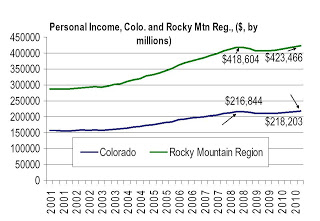Colorado has now exceeded the personal income levels reached prior to the financial panic of 2008.
At $218.2 billion, personal income in Colorado has now exceeded the peak levels reached during the third quarter of 2008, when personal income reached $216.8 billion. Personal income is now up by 0.6 percent from previous levels.
During the third quarter of 2010, the rocky Mountain Region and the US as a whole had exceed pre-recession levels while Colorado lagged.
Colorado still lags the US and region. As of the 4th quarter of 2010, The Rocky Mountain region is 1.1 percent above peak levels and the US is 2.0 percent above its own previous peak which occurred during the second quarter of 2008.
Over ten years from the 4th quarter of 2001 to the fourth quarter of 2010, US personal income iuncreased 42.8 percent, and in Colorado it increased 40.0 percent. In the Rocky Mountain region, the increase for the same period was 47.3 percent.

This is just one measure in which Colorado underperformed compared to the nation during the last decade. Overall job growth and income growth was also more sluggish in Colorado during this period as compared to many regions in the United States. The most recent report also shows Colorado in the lowest quintile of all states for personal income growth.
As has been noted by some regional economists, Colorado has recovered more slowly since the most recent recession than have other states in the Rocky Mountain region.
However, over the past year, Colorado has nearly matched regional growth. From the 4th quarter of 2009 to the 4th quarter of 2010, personal income increased 3.8 percent nationwide, while it increased 3.4 percent in Colorado. Income increased 3.5 percent in the Rocky Mountain region during the same period.
Overall, Colorado's real estate markets and labor markets have not suffered as much as many markets, but in a variety of ways, including personal income, Colorado is recovering more slowly than the nation. January 2011 employment data also showed Colorado's unemployment rate moving above the nationwide unemployment rate for the first time since the most recent recession began in late 2007.
Generally speaking, personal income has been flat in Colorado since 2008 reflecting a sluggish job market and wage growth. An increase of 0.6 percent over the previous peak, being an estimate, is effectively a sideways movement in income.
Note: Personal income is the income received by all persons from all sources. Personal income is the sum of net earnings by place of residence, property income, and personal current transfer receipts. Total personal income will rise as population rises, even if household incomes are declining. Property income is rental income of persons, personal dividend income, and personal interest income. Net earnings is earnings by place of work (the sum of wage and salary disbursements, supplements to wages and salaries, and proprietors' income) less contributions for government social insurance, plus an adjustment to convert earnings by place of work to a place-of-residence basis. Personal income is measured before the deduction of personal income taxes and other personal taxes and is reported in current dollars (no adjustment is made for inflation).